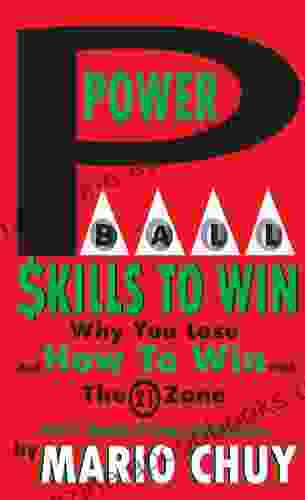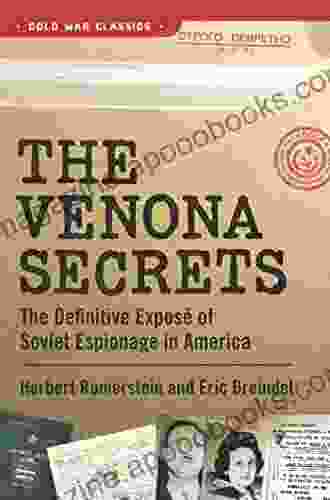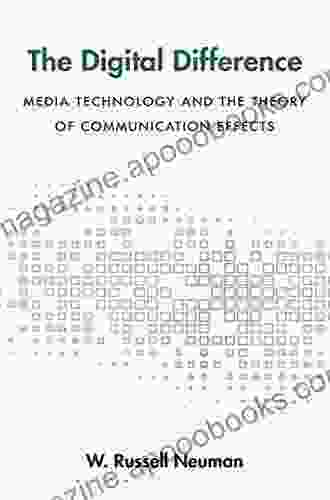Exposing Soviet Espionage and America's Traitors: A Cold War Classic

The Cold War was a time of great tension between the United States and the Soviet Union. Both countries were engaged in a fierce competition for global dominance, and espionage played a major role in this conflict.
The Soviet Union had a vast network of spies operating in the United States. These spies were tasked with collecting intelligence on American military secrets, political plans, and economic activities. They also worked to recruit American citizens to work for the Soviet cause.
4.7 out of 5
| Language | : | English |
| File size | : | 6403 KB |
| Text-to-Speech | : | Enabled |
| Screen Reader | : | Supported |
| Enhanced typesetting | : | Enabled |
| Word Wise | : | Enabled |
| Print length | : | 593 pages |
Some of the most famous Soviet spies include Julius and Ethel Rosenberg, who were executed for espionage in 1953; Klaus Fuchs, a German-born physicist who helped the Soviets develop their atomic bomb; and Donald Maclean, Guy Burgess, Anthony Blunt, and Kim Philby, four British diplomats who defected to the Soviet Union in 1951.
The United States also had its own network of spies operating in the Soviet Union. These spies were tasked with collecting intelligence on Soviet military secrets, political plans, and economic activities. They also worked to recruit Soviet citizens to work for the American cause.
One of the most famous American spies was John Anthony Walker, a Navy officer who sold classified information to the Soviets for over a decade. Walker was arrested in 1985 and sentenced to life in prison.
The Cold War ended in 1991, but the legacy of Soviet espionage continues to this day. The stories of the spies who operated during this time are a reminder of the dangers of espionage and the importance of protecting national security.
The Rosenbergs
Julius and Ethel Rosenberg were a married couple who were executed for espionage in 1953. They were convicted of providing atomic secrets to the Soviet Union. The Rosenbergs were the first American civilians to be executed for espionage.
The Rosenbergs were both members of the Communist Party USA. They were recruited to spy for the Soviet Union in 1944. The Rosenbergs provided the Soviets with information about the American atomic bomb project.
The Rosenbergs were arrested in 1950. They were convicted of espionage in 1951. The Rosenbergs were sentenced to death in 1953.
The execution of the Rosenbergs was a controversial event. Many people believed that the Rosenbergs were innocent. Others believed that the Rosenbergs were traitors who deserved to die.
Klaus Fuchs
Klaus Fuchs was a German-born physicist who helped the Soviets develop their atomic bomb. Fuchs was recruited to spy for the Soviet Union in 1942. He provided the Soviets with information about the American atomic bomb project.
Fuchs was arrested in 1950. He was convicted of espionage in 1951. Fuchs was sentenced to 14 years in prison. He was released from prison in 1959.
Fuchs's espionage activities had a significant impact on the Cold War. The information he provided to the Soviets helped them to develop their own atomic bomb. This led to an arms race between the United States and the Soviet Union.
The Cambridge Five
The Cambridge Five was a group of five British diplomats who defected to the Soviet Union in 1951. The members of the Cambridge Five were Donald Maclean, Guy Burgess, Anthony Blunt, and Kim Philby.
The Cambridge Five were recruited to spy for the Soviet Union in the 1930s. They provided the Soviets with information about British foreign policy, military secrets, and economic activities.
The Cambridge Five were not discovered until 1951. They were all expelled from the British Foreign Service. The members of the Cambridge Five lived out the rest of their lives in the Soviet Union.
The Cambridge Five was one of the most successful spy rings in history. They provided the Soviets with a wealth of information that helped them to gain an advantage in the Cold War.
John Anthony Walker
John Anthony Walker was a Navy officer who sold classified information to the Soviets for over a decade. Walker was recruited to spy for the Soviet Union in 1968. He provided the Soviets with information about American submarine operations, weapons systems, and communications networks.
Walker was arrested in 1985. He was convicted of espionage in 1986. Walker was sentenced to life in prison.
Walker's espionage activities had a significant impact on the Cold War. The information he provided to the Soviets helped them to develop new weapons and strategies. This led to an escalation of the arms race between the United States and the Soviet Union.
The Legacy of Soviet Espionage
The legacy of Soviet espionage continues to this day. The stories of the spies who operated during this time are a reminder of the dangers of espionage and the importance of protecting national security.
The Cold War ended in 1991, but espionage remains a major threat to national security. The United States and other countries continue to operate spy networks around the world. Espionage is a necessary evil in the modern world. It is essential for countries to protect their national security interests. However, espionage must be conducted in a responsible manner. Spies must not be allowed to operate with impunity. They must be held accountable for their actions.
The legacy of Soviet espionage is a reminder of the dangers of espionage. It is also a reminder of the importance of protecting national security. The United States and other countries must continue to work together to combat espionage and protect their national security interests.
4.7 out of 5
| Language | : | English |
| File size | : | 6403 KB |
| Text-to-Speech | : | Enabled |
| Screen Reader | : | Supported |
| Enhanced typesetting | : | Enabled |
| Word Wise | : | Enabled |
| Print length | : | 593 pages |
Do you want to contribute by writing guest posts on this blog?
Please contact us and send us a resume of previous articles that you have written.
 Book
Book Novel
Novel Page
Page Chapter
Chapter Text
Text Story
Story Genre
Genre Reader
Reader Library
Library Paperback
Paperback E-book
E-book Magazine
Magazine Newspaper
Newspaper Paragraph
Paragraph Sentence
Sentence Bookmark
Bookmark Shelf
Shelf Glossary
Glossary Bibliography
Bibliography Foreword
Foreword Preface
Preface Synopsis
Synopsis Annotation
Annotation Footnote
Footnote Manuscript
Manuscript Scroll
Scroll Codex
Codex Tome
Tome Bestseller
Bestseller Classics
Classics Library card
Library card Narrative
Narrative Biography
Biography Autobiography
Autobiography Memoir
Memoir Reference
Reference Encyclopedia
Encyclopedia Henry D Sokolski
Henry D Sokolski Isabella Fischer
Isabella Fischer Harold Pinter
Harold Pinter Jael Brown
Jael Brown Hervie Haufler
Hervie Haufler Saranna Dewylde
Saranna Dewylde Steve Physioc
Steve Physioc P D James
P D James Irina Nevzlin
Irina Nevzlin Richard Matheson
Richard Matheson Hermann Sudermann
Hermann Sudermann Luis Chesney Lawrence
Luis Chesney Lawrence Paddy Dillon
Paddy Dillon Helen Robinson
Helen Robinson Herbert J Stern
Herbert J Stern Heidi Harris
Heidi Harris The United States Army
The United States Army Ian Pringle
Ian Pringle Howie Kahn
Howie Kahn Stephen John
Stephen John
Light bulbAdvertise smarter! Our strategic ad space ensures maximum exposure. Reserve your spot today!

 Anthony BurgessJourney into the Enchanting World of "Anastasia Songbook: The New Broadway...
Anthony BurgessJourney into the Enchanting World of "Anastasia Songbook: The New Broadway...
 Ken SimmonsIntroducing The One-Dimensional Heat Equation Encyclopedia of Mathematics and...
Ken SimmonsIntroducing The One-Dimensional Heat Equation Encyclopedia of Mathematics and... George MartinFollow ·17.9k
George MartinFollow ·17.9k Philip BellFollow ·7.1k
Philip BellFollow ·7.1k Ernest J. GainesFollow ·18.8k
Ernest J. GainesFollow ·18.8k Robin PowellFollow ·7.3k
Robin PowellFollow ·7.3k Allen ParkerFollow ·17.1k
Allen ParkerFollow ·17.1k George BellFollow ·17.9k
George BellFollow ·17.9k Felix CarterFollow ·4.3k
Felix CarterFollow ·4.3k Sam CarterFollow ·16.1k
Sam CarterFollow ·16.1k

 Stanley Bell
Stanley BellUnlock the Secrets of Powerball Success: Master the...
Prepare to shatter the odds and transform...

 Ernest J. Gaines
Ernest J. GainesPatti Smith Horses 33 55: A Photographic Journey into a...
Journey into the raw and...

 Isaiah Price
Isaiah PriceMoyamoya Disease Diagnosis And Treatment: A Comprehensive...
Moyamoya Disease...

 Joseph Foster
Joseph FosterRecent Advances in Ophthalmology, Volume 14
Editor: [Editor's...
4.7 out of 5
| Language | : | English |
| File size | : | 6403 KB |
| Text-to-Speech | : | Enabled |
| Screen Reader | : | Supported |
| Enhanced typesetting | : | Enabled |
| Word Wise | : | Enabled |
| Print length | : | 593 pages |












